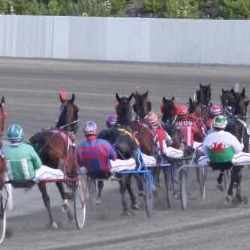Those hoping to keep open the Plainridge Racetrack in Plainville cheered after it was announced the Massachusetts Gaming Commission had approved a slots license for the venue. Supporters of the bill gathered outside the race course to rally in support of gaming machine bill, which would turn the track into a racino-style gaming venue. A “racino” is part-racetrack, part-casino, usually through the inclusion of gaming machines.
In a twist, supporters of the bill cheered Timothy Wilmott, the CEO of Penn National Gaming, Incorporated, which owns the Plainridge Racetrack. Penn National Gaming, Inc. is an operator of casinos and racetracks, based in Wyomissing, Pennsylvania. The company is the largest pari-mutuel wagering business in America. Wilmott told the celebratory audience, “The fact that we’re saving harness racing here in the commonwealth is what saved the day for us and got us the jackpot.”
Celebration by Plainville’s Citizens
The festive atmosphere was a natural reaction, since many in the crowd were employees of the racing venue, or family members of an employee. The general consensus believe that a decision against a machine gaming at Plainridge would have meant the end of the gaming establishment altogether.
In securing the gaming machines, Plainridge promised to maintain 120 jobs in simulcasting and track jobs, along with 500 permanent employees. 1,000 construction jobs, which are part of a renovation project by Penn National, also were part of the proposal to the Massachusetts Gaming Commission.
Projected Numbers for Plainridge
Penn National Gaming Inc predicted the track would provide $200 million to the State of Massachusetts in its first two years, plus $60 million per year every year after that. Plainville will receive $4.3 million every year of operation, too. The track itself should receive a significant amount of new revenue, allowing the gaming operation to survive and even prosper.
Twin Rivers Loses Revenue
The biggest loser in the new bargain is expected to be Twin Rivers Casino in Lincoln, Rhode Island, which is 20 miles down the road from Plainville. Twin Rivers has 4,500 slot machines and 80 gaming tables, and traditionally has lured many gamblers from nearby Massachusetts. The extra forty minute round-trip to Twin Rivers may be less appealing, if Massachusetts gamblers can enjoy slot machines in their state at the closer facility.
Twin Rivers Casino is likely to remain a threat, though. The table gaming provides blackjack, roulette, craps, and poker, which won’t be available at the racetrack. Still, Twin Rivers predicts they will lose about 10% of their revenues. Timothy Wilcott predicts that number might be closer to 25% of their business.
When asked about the nearby competition, Wilcott said, “I know a lot of their customers come from Massachusetts and it’s a bit of a ride from this point to Twin Rivers and convenience usually wins. We’re not afraid of competition. We like that we’ll have a head start and have relationships with customers at our facility probably before other competition comes in.”
Leo Bernal Criticizes State-Backed Gaming
Not everyone is happy with the increasing number of gambling facilities across the United States. More state governments look to state-regulated gambling as an answer to budget concerns, but the anti-gambling public policy groups continue to fight each legislative battle with fervor. Les Bernal is among the most vocal leaders in the public debate.
Longtime state-sponsored gambling opponent Les Bernal recently gave an interview with Deseret News National, a Utah-based online news, sports, and entertainment service. Les Bernal is the executive director for “Stop Predatory” gambling, so it’s no surprise he would have harsh words on the recent expansion of online gambling in the United States.
In the interview, Bernal said, “We started with scratch tickets, then many states moved on to slot machines, now onto Internet gambling. They are going to try to open up a casino or lottery retailer in every home, every bedroom, every dorm and every office in a state.”
He added, “What you’re seeing now is that there are Democrats and Republicans on the other side who will lobby for this because they’re looking for gimmicks, quick fixes, right? These are people who don’t want to tell the people that they’re either going to have to pay more taxes or cut services.”
While online gambling was a target, most of Bernal’s talk centered around the state lotteries. He went on to call the state lottery a “regressive tax”, meaning it’s a tax on the poorest economic class. He complained that people making less than $25,000 thought their best chance to build wealth was to play the lottery, instead of save in order to build assets.

